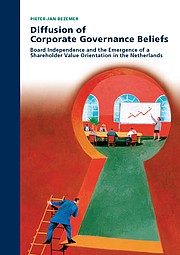Diffusion of Corporate Governance Beliefs: Board independence and the emergence of a shareholder value orientation in the Netherlands Defended on Friday, 19 March 2010
The globalization and liberalization of national economies have contributed to an increasing diffusion of Anglo-American corporate governance practices worldwide. In this dissertation, we examine the spread of two types of corporate governance beliefs: the emerging focus on board independence and a shareholder value orientation. Through a series of five studies, utilizing multiple theoretical lenses, levels of analysis and methods, we analyze developments in the formal independence of supervisory boards and a greater focus on shareholder value in the Netherlands, and examine the antecedents and consequences of these phenomena.
In doing so, we contribute to the enrichment of theories on diffusion processes as well as to the understanding of key changes in the Dutch corporate governance landscape. We show that (i) substantive change has taken place in the governance of listed corporations, (ii) the technical, political and cultural contexts in which firms operate explain companies’ (non)response to prevailing corporate governance beliefs, (iii) changing corporate governance beliefs may be associated with unintended consequences and negative performance implications, and (iv) macro contextual factors have a significant impact on the aforementioned processes. Thereby, our findings highlight important avenues for further research. Furthermore, we provide directors, regulators, shareholders and other stakeholders with new insights in key corporate governance developments, in particular in the Netherlands.
Keywords
corporate governance beliefs, diffusion processes, board of directors, supervisory board chairman, strategy, board networks, shareholder value orientation, technical, cultural and political fit, the Netherlands












